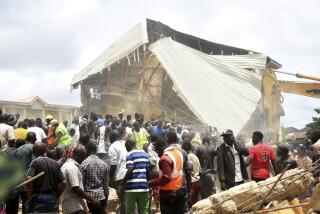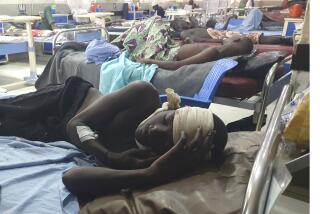Suicide attack kills 18 at U.N. compound in Nigeria
Reporting from Abuja, Nigeria, and Johannesburg, — At least 18 people were killed Friday when a suicide bomber smashed a car through the gates of the U.N. headquarters in the Nigerian capital, Abuja, raising fears that a homegrown Islamic militant group inspired by the Taliban is widening its attacks to include Western targets.
A spokesman for Boko Haram claimed responsibility for the attack, the most serious by the group, which is based in Nigeria’s Muslim majority north and that some believe is forging links to Al Qaeda.
“More attacks are on the way, and by the will of Allah we will have unfettered access to wherever we want to attack,” the spokesman, Abu Darda, said by phone. “We have more than 100 men who are willing to lay down their lives for the cause of Allah.”
The blast just before 11 a.m. left a gaping hole in the four-story building, which houses about 400 people working for 26 United Nations humanitarian and development agencies. It’s not clear how many were present, but dozens were injured. There was concern that the number of dead could rise sharply.
Witnesses said the driver rammed the lower floor of the building. They reported a huge explosion and saw bodies scattered in front of the building.
“This was an assault on those who devote their lives to helping others,” U.N. Secretary-General Ban Ki-moon said. “We condemn this terrible act utterly.”
It was Boko Haram’s first attack on a foreign target. The group has struck government buildings such as police stations, mainly in the north, including a June attack on the police headquarters in Abuja that left six dead.
“Boko Haram,” roughly translated, means “Western education is a sin.” It opposes the Nigerian government and Western culture and wants to impose a strict Islamic state across Nigeria. Security analysts fear that the group may be getting external support and may have developed links with Al Qaeda.
The U.S. military commander in Africa, Gen. Carter Ham, told the Associated Press recently that Boko Haram might be seeking to mount joint attacks in Nigeria with other African militants.
He said intelligence sources indicated that Boko Haram had made contact with Al Qaeda in the Islamic Maghreb, which operates in North Africa, and with the Shabab in Somalia.
In an interview with a Times reporter in northern Nigeria last year, one of the group’s leaders said it wanted to shift its focus from domestic targets.
“The U.S. is the major target because it’s the major aggressor against Muslims throughout the world,” said the militant, who gave his name only as Musa. “America is the main aggressor, and I believe all these attacks against America are divine worship.
“They are fighting Islam and we will also fight them, if we get the chance,” he said.
Nigerian President Goodluck Jonathan described the attack as “barbaric, senseless and cowardly” and boosted security in the capital.
“The president believes that the attack is a most despicable assault on the United Nations’ objectives of global peace and security, and the sanctity of human life to which Nigeria wholly subscribes,” said a statement released by his office.
“President Jonathan reaffirms the federal government’s total commitment to vigorously combat the incursion of all forms of terrorism into Nigeria, and wishes to reassure all Nigerians and the international community that his administration will spare no effort to bring the perpetrators to justice.”
Special correspondent Aminu Abubakar in Kano, Nigeria, contributed to this report.
Special correspondent Ndukauba reported from Abuja and Times staff writer Dixon from Johannesburg.
More to Read
Sign up for Essential California
The most important California stories and recommendations in your inbox every morning.
You may occasionally receive promotional content from the Los Angeles Times.










